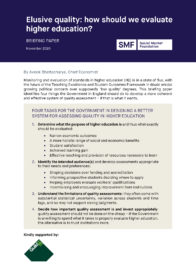This briefing paper provides an overview of the current system of quality assessment in higher education, exploring how well it functions and the main criticisms levied at it. The report also identifies four tasks for the Government should it want to design a better system of quality assessment.
Monitoring and evaluation of standards in higher education (HE) is in a state of flux, with the future of the Teaching Excellence and Student Outcomes Framework in doubt amidst growing political concern over supposedly ‘low quality’ degrees. As critics raise concerns about the ‘quality’ of HE courses and the system of assessment currently in place for evaluating it, this report highlights key questions that must be answer about both the definition of quality in HE and how effectively it can be assessed.
Four tasks for the Government in designing a better system for assessing quality in higher education
- Determine what the purpose of higher education is and thus what exactly should be evaluated
- Identify the intended audience(s) and develop assessments appropriate to their needs and preferences:
- Understand the limitations of quality assessments: they often come with substantial statistical uncertainty, variation across students and time lags, and so may not support strong judgments.
- Decide how important quality assessment is and invest appropriately: quality assessment should not be done on the cheap – if the Government is unwilling to spend what it takes to properly evaluate higher education, the alternative is to trust institutions more.


